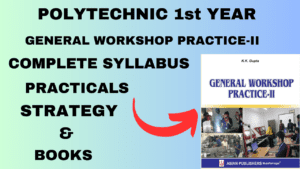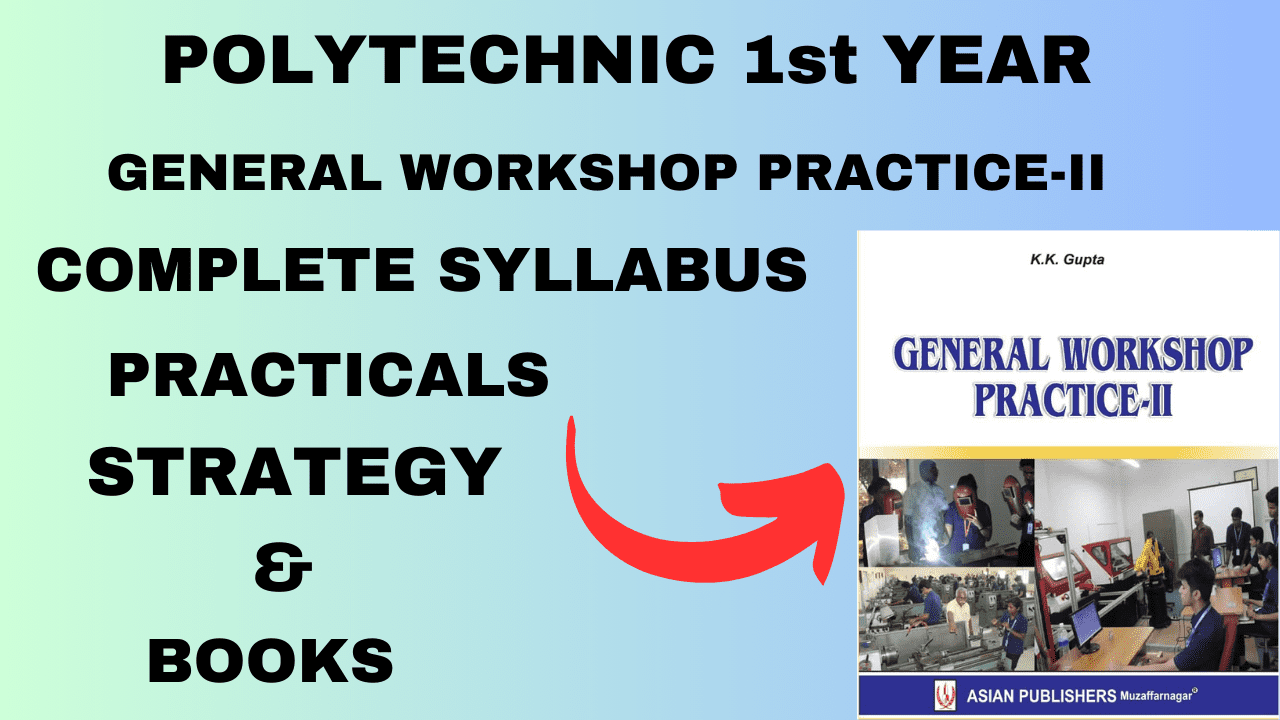Dear students, if you are a student of Polytechnic First Year Second Semester of Electrical & Electronics Engineeering and you want to know what are the units in General Workshop Practice 2, then you have reached the right place. Today’s post , we will tell you in detail about the General Workshop Practice 2 Syllabus which is approved by BTEUP and this is the Electronic Components & Devices new syllabus .
Before we start the post one thing you were must know which is, General Workshop Practice 2 is a common with Electronics Engineering. So let’s start the post and read about General Workshop Practice 2 detailed syllabus.

Download Applied Physics-II Syllabus click here
DETAILED CONTENTS OF POLYTECHNIC SECOND SEMESTER GENERAL WORKSHOP PRACTICE 2 FOR ELECTRICAL & ELECTRONICS ENGINEERING
Note:- The students are supposed to come in proper workshop dress prescribed by the institute. Wearing shoes in the workshop(s) is compulsory. Importance of safety and cleanliness, safety measures and upkeep of tools, equipment and environment in each of the following shops should be explained and practiced. The students should prepare sketches of various tools/jobs in their practical Notebook.
1.) CARPENTARY SHOP
1.1) General Shop Talk
- Name and use of raw materials used in carpentry shop : wood & alternative materials.
- Names, uses, care and maintenance of hand tools such as different types of Saws, C-Clamp, Chisels, Mallets, Carpenter’s vices, Making gauges, Try-squares, Rulers and other commonly used tools and materials used in carpentry shop by segregating as cutting tools, supporting tools, holding tools, measuring tools etc.
- Specification of tools used in carpentry shop.
- Differnent types of Timbers, their properties, uses & defects.
- Seasoning of wood.
1.2) Practice
- Practices for basic carpentry work.
- Sawing practice using different types of saws.
- Assembling jack plane- Planning practice including sharpening of jack plane cutter.
- Chiselling practice using different types of chisels including sharpening of chisel.
- Making of different types of wooden pin and fixing methods. Marking
measuring and inspection of jobs.
1.3) Job Practice
Job I- Marking, sawing, planning and chiselling and their practice
Job II- Half Lap Joint (cross, L or T- any one)
Job III- Mortise and Tenon joint (T-joint)
Job IV- Dove tail joint (Lap or Bridle Joint)
1.4) Demonstration of job showing use of Rip Saw, Bow saw and Tenon saw, method of sharpening various saws.
Download Applied Mathematics-II Syllabus click here
2.) PAINTING AND POLISHING SHOP
2.1) Introduction of paints, varnishes, Reason for surface preparation, Advantages of Painting, other method of surface coating ie. Electroplating etc.
2.2) Job Practice
Job I: To prepare a wooden surface for painting apply primer on one side and to paint the same side. To prepare french polish for wooden surface and polish
the other side.
Job II: To prepare metal surface for painting, apply primer and paint the same.
Job III: To prepare a metal surface for spray painting, first spray primer and paint the same by spray painting gun and compressor system.
The sequence of polishing will be as follows:
i) Abrasive cutting by leather wheel
ii) Polishing with hard cotton wheel and with polishing material
iii) Buffing with cotton wheel or buff wheel.
3.) ELECTROPLATING SHOP
3.1) Use of personal protective equipments and safety precautions while working.
3.2. Introduction and demonstration of machines and equipment used in electroplating shop.
3.3 Practice Job
Job I : Electroplating practice i.e. Nickel plating.
4.) COMPUTER SHOP
4.1) Keyboard
- Types of Keyboards
- Interfacing (PS2, USB port, DIN connector)
- Working
4.2) Mouse
- Types of Mouse
- Interfacing (serial, PS2, USB)
- Working
4.3) Printers
- Types (Dot matrix, Inkjet, Laserjet)
- Interfacing (parallel port, USB port, Networking)
- Working
- Maintenance (cartridge change etc)
- Installation of printers
- Troubleshooting (Driver compatibility, Paper jam, printing problems due to uncleaned drum in laserjet printers, belt related problems in inkjet printer, jets choking problem in inkjet printer, color alignment problem).
- Tracing network printer and sharing it.
4.4) Scanner
- Types
- Interfacing
- Scanning a document
4.5) Monitor
- Types and Interfacing
- Fault finding and repairing
4.6) CPU
- Motherboard connection (dimensions, processor, chipset, BIOS, EFI (Extended Firmware Interfacing), UFI (Unified Firmware Interfacing).
- SMPS-AT
- Working
- Voltage levels
Download Basic Electrical Engineering Syllabus click here
LEARNING OUTCOMES
After completing the course, the students will be able to:
• Identify tools and equipment used and their respective functions.
• Identify different types of materials and their basic properties.
• Use and take measurements with the help of basic measuring tools/equipment.
• Select proper tools for a particular operation.
• Select materials, tools, and sequence of operations to make a job as per given
specification/drawing.
• Prepare simple jobs independently and inspect the same.
• Follow safety procedures and precautionary measures.
• Use safety equipment and Personal Protection Equipment.
MEANS OF ASSESSMENT
- Workshop jobs
- Report writing, presentation and viva voce
Download ELECTRONIC COMPONENTS & DEVICES Syllabus click here
RECOMMENDED BOOKS
1.) Workshop Technology I,II,III, by SK Hajra, Choudhary and AK Choudhary; Media Promoters and Publishers Pvt. Ltd. Mumbai.
2.) Workshop Technology Vol. I, II, III by Manchanda; India Publishing House, Jalandhar.
3). Workshop Training Manual Vol. I, II by S.S. Ubhi; Katson Publishers, Ludhiana.
4). Manual on Workshop Practice by K Venkata Reddy; MacMillan India Ltd., New Delhi.
5). Basic Workshop Practice Manual by T Jeyapoovan; Vikas Publishing House (P) Ltd., New Delhi.
6). Workshop Technology by B.S. Raghuwanshi; DhanpatRai and Co., New Delhi.
7). Workshop Technology by HS Bawa; Tata McGraw Hill Publishers, New Delhi.
8). E-books/e-tools/relevant software to be used as recommended by AICTE/ NITTTR, Chandigarh.
Download General Workshop Practice 2 Syllabus click here
Dear Students, please comment your suggestion and for any other subject’s BOOK, notes and syllabus PDF, leave a comment and tell us how you liked this article.
To read more article like this, bookmark website booksandsolutions.in
Thank you for giving us your most valuable time.
